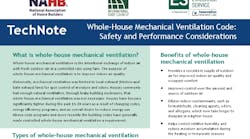Latest from Codes
Sponsored
WASHINGTON — The International Code Council and ICC Evaluation Service are working with the National Association of Home Builders to distribute the TechNotes series developed by NAHB’s Construction Technology Research Subcommittee and Innovation Research Lab.
The series is designed to assist builders in understanding and applying the latest code requirements as well as implementing best practices in order to avoid building performance issues related to interior humidity levels, condensation in wall and roof assemblies, and interior air quality.The TechNotes series will continue to expand and include new topics. Currently included, and available free of charge, are the following: • Whole-house mechanical ventilation. A summary of International Residential Code requirements for installing whole-house mechanical ventilation systems. System types, benefits, costs and design considerations are covered.
• Building air tightness. A summary of building code (IRC and International Energy Conservation Code) requirements for building tightness, blower door testing and air barriers. Critical areas of a house needing proper air sealing are identified.
• Floors above crawlspaces. Recommendations and best practices for floor construction over crawlspaces in hot/humid climates. Considerations include vapor permeability of floor materials, type of floor insulation and proper ventilation.
• Rain and groundwater. Recommendations and best practices for exterior wall drainage and bulk moisture control to avoid water infiltration into basements and crawlspaces. Covered practices include overhangs, gutters, flashing and water-resistant barriers, foundation drains and waterproofing, and site grading.
• Window and door flashing. A summary of IRC requirements and best practices for window and door flashing. Covered are flashing material types, proper installation methods, standard details, and references to industry sources for additional guidance and details.
• Vapor retarders. Recommendations for proper selection of vapor retarders and best practices for proper placement within the wall assembly. Existing building code requirements are summarized and climate zone-specific recommendations provided.
• Supplemental dehumidification. Recommendations for controlling interior humidity levels in homes in hot/humid climates. Existing building code requirements are summarized and best practices for installation of both stand-alone and integrated dehumidifiers are provided.



